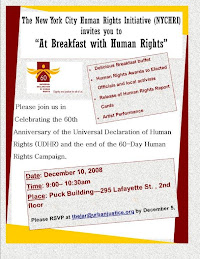UNITED NATIONS
Press Release
International Day for the Eradication of Poverty
17 October 2008
Statement by the United Nations High Commissioner for Human Rights, Navi Pillay
On this International Day for the Eradication of Poverty, I would like to pay tribute to those who strive to defend the rights of some 1.4 billion people still living in abject poverty and exclusion around the world. This year marks not only the 60th anniversary of the Universal Declaration of Human Rights, but also the 10th anniversary of the Declaration on Human Rights Defenders.
In 1987, a year after the Declaration on the Right to Development was adopted by the General Assembly, more than 100,000 human rights defenders from all over the world gathered on this day to express their solidarity in the fight against extreme poverty and their commitment to ensure that everyone's dignity and freedom are respected.
Those human rights defenders are at the forefront in sounding the alarm and protecting the rights of the poor. Our collective responsibility is to ensure their efforts are matched with concrete action and accountability.
Poverty and inequality often exacerbate abuse, neglect and discrimination, denying millions the enjoyment of their civil, cultural, economic, political and social rights, and ultimately, their right to development. Our efforts to fight poverty and to achieve the Millennium Development Goals must be firmly grounded in the universal values and principles enshrined in the Universal Declaration on Human Rights and international human rights instruments.
There have been some significant development gains over the years, but these cannot be sustained, if rights are not anchored in laws and institutions, and if those in power are not aware of their responsibilities to uphold people's rights, and are not held accountable for their failures.
The current financial crisis, and the huge challenges posed by climate change and systemic problems in the global food supply, make it essential for us to act beyond narrow national interests, in the spirit of global cooperation laid down in the Universal Declaration of Human Rights and the numerous other international laws and guidelines that it spawned. Operationalizing the right to development would offer better prospects for reducing poverty and enhancing accountability at both the national and global levels.
Poverty exists everywhere – as do human rights challenges – and they are often inextricably linked. International days such as this often stimulate fine words, but they need to be backed by deeds. The philosophy and structures for combating poverty at the international level exist. But a true commitment to translate that philosophy into effective action, which will improve the actual day-to-day life of almost one quarter of the world's population who live in poverty, is still far from evident.
Reducing poverty is an achievable goal. What we need is to bring the rights and dignity of those who are suffering most to the centre of our efforts.





No comments:
Post a Comment